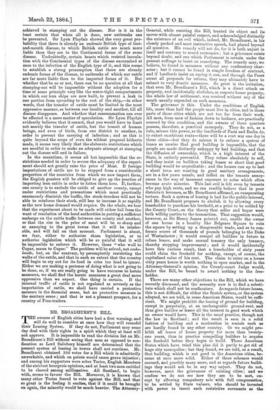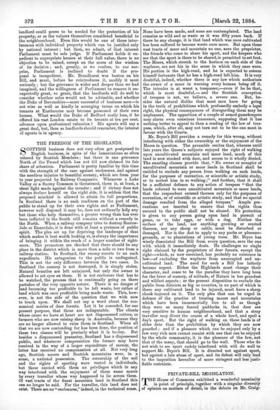MR. BROADHURST'S BILL.
THE owners of English cities have had a first warning, and will do well to consider at once how they will remodel their Leasing System. If they do not, Parliament may some day deal with their rights in a spirit which they at least will not approve. It is impossible to read the division list on Mr.
Broa.dhurst's Bill without seeing that men as opposed to confiscation as Lord Salisbury himself are determined that the present system of leasing in towns shall not continue. Mr. Broadhurst obtained 104 votes for a Bill which is admittedly unworkable, and which on points would cause grave injustice ; and among his supporters were sober Tories, English Members of the strictest bourgeois opinions, and at least two men entitled to be classed among millionaires. All Scotland, to begin with, seems to favour the Bill. Moreover, it is known that many other Tories feared to vote against the Bill, and that so great is the feeling it excites, that if it could be brought on again, the minority would .be much heavier. The Attorney-
General, while resisting the Bill, treated its object and its mover with almost painful respect, and acknowledged distinctly the existence of an evil which, indeed, Mr. Broadhurst, in his closely packed and most instructive speech, had placed beyond all question. His remedy will not do, for it is both unjust in itself and contrary to sound economics ; but a grievance exists beyond doubt, and one which Parliament is certain under the present suffrage to insist on remedying. The remedy may, we believe, be found in measures without any confiscatory char- acter ; but it cannot be found in simple freedom of contract, and if landlords insist on saying it can, and through the Peers arrest all proposals for reform, they may ultimately have to submit to very drastic measures. So great is the irritation, that even Mr. Broadhurst's Bill, which is a direct attack on property, and incidentally abolishes, as respects house property, the whole law of settlement, was received without any of the wrath usually expended on such measures.
The grievance is this. Under the conditions of English life, more than half the people must live in cities, and in those parts of those cities which are not too far from their work. All men, from men of fashion down to hodmen, are practically coerced by this condition, and the owners of those quarters possess, therefore, a practical monopoly. They do not, as a rule, misuse this power, as the landlords of Paris and Berlin do, to extort exorbitant rents—there will be a rent war one day in those cities—but they do misuse it to enforce a system of leases so unwise that good building is impossible, that the people are made distinctly unhappy by bad building, and that the diffusion of ownership, which is a high interest of the State, is entirely prevented. They refuse absolutely to sell, and they insist on builders taking leases so short that good building would be unprofitable ; and the houses run up to last a short term are wanting in good sanitary arrangements, are in a few years unsafe, and inflict on the tenants annoy- ances in the way of incessant exposure to noise which often become acute miseries. This last evil is felt even by tenants who pay high rents, and we can readily believe that in poor districts it becomes, as Mr. Broadhurst affirmed, an exasperating torture. Such a system of leasing is bad for the public interest, and Mr. Broadhurst proposes to abolish it by allowing every leaseholder to purchase his freehold, at a price to be settled by the County Court, on the theory that seller and buyer were both willing parties to the transaction. That suggestion would, however, as Sir Henry James pointed out, enable the owner of one house in a locality like Belgrave Square to ruin the square by setting up a disagreeable trade, and so to con- fiscate scores of thousands of pounds belonging to the Duke of Westminster ; it would compel all builders in future to refuse leases, and make annual tenancy the only tenancy, thereby stopping improvement ; and it would incidentally have this curious result, that a leaseholder of sixty years could claim the freehold for nothing, except, of course, the capitalised value of his rent. The claim to enter on a house sixty years hence is worth nothing in open market, and in the Attorney-General's opinion, the County-court Judge would, under the Bill, be bound to award nothing to the free- holder.
There are many other objections to the Bill, which we have recently discussed, and the necessity now is to find a substi- tute which shall not be confiscatory. As regards future leases, this is not difficult, for either the Scotch system, or the system adopted, we are told, in some American States, would be suffi- cient. We might prohibit the leasing of ground for building, except in perpetuity, at an unchangeable ground-rent, and thus give builder or lessee all the interest in good work which an owner would have. This is the usual practice, though not the law in Scotland ; and the result is seen in a solid fashion of building and a moderation in rentals such as are hardly found in any other country. Or we might pro- hibit all leases of house property for more than twenty one years, thus in practice compelling builders to acquire the freehold before they begin to build. Those American States which have tried this plan did it partly to get rid of huge city monopolies ; but they found, we are told, as a result, that building, which is not good in the American cities, be- came at once more solid. Either of these schemes would succeed, and possibly many more, and as regards future build- ings they would not be in any way unjust. They do not, however, meet the grievances of existing cities ; and we confess we do not see how they are to be met, ex- cept by allowing compulsory sale with full compensation, to be settled by State valuers, who should be invested with power to insert such restrictive covenants as the
landlord could prove to be needed for the protection of his property, or as the valuers themselves considered beneficial to the neighbourhood. Even this would be one of those inter- ferences with individual property which can be justified only by national interest ; but then, we admit, of that interest Parliament must be sole judge. If Parliament holds it ex- pedient to expropriate houses at their full value, there is no objection to be raised, except on the score of the wisdom of its decision ; and, greatly, as we confess, to our sur- prise, Parliament is inclined to doubt if the pro- posal is inexpedient. Mr. Broadhurst was beaten on his Bill, and must, before he reintroduces it, modify it most seriously ; but the grievance is wider and deeper than we had imagined, and the willingness of Parliament to remove it un- expectedly great, so great, that the landlords will do well to consider whether sales would not be advisable, and whether the Duke of Devonshire—most successful of business men—is not wise as well as kindly in arranging terms on which his tenants at Eastbourne may become possessed of their own houses. What would the Duke of Bedford really lose, if he offered his vast London estate to its tenants at ten per cent. advance upon professional valuation ? His agents will say a great deal, but, then as landlords should remember, the interest of agents is in agency.



































 Previous page
Previous page